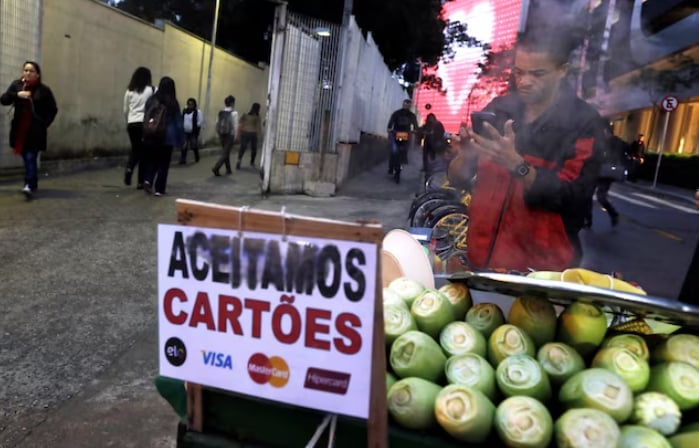May 31, 2025 | 02:23 GMT +7
May 31, 2025 | 02:23 GMT +7
Hotline: 0913.378.918
May 31, 2025 | 02:23 GMT +7
Hotline: 0913.378.918

A sign saying that credit card are accepted is seen on a corn vendor cart in a street in Sao Paulo, Brazil August 16, 2018.
Brazil is set to face inflationary pressure from rising corn prices, which could overshadow a sharp drop in rice, as President Luiz Inacio Lula da Silva's administration struggles to contain public discontent over high food inflation.
Corn prices in the Campinas region have surged past 90 reais ($15.80) per 60-kg bag, the highest nominal level in nearly three years, marking a more than 23% jump year-to-date, according to the widely followed Cepea index from the University of Sao Paulo.
That contrasts with paddy rice prices, which have dropped below 80 reais per 50-kg bag in Rio Grande do Sul for the first time since October 2022.
Rice prices have slumped due to an expected 15% rise in Brazilian production driven mainly by a recovery of Rio Grande do Sul's harvest, and improved global supply.
Conversely, corn prices have climbed amid low starting stocks, robust demand from the ethanol and meat industries, and the development of Brazil's second corn crop amid weather uncertainty.
"A major risk for food (inflation) is corn, the main input for poultry, pork, and cattle feed, including both meat and dairy production," consultancy Datagro said on Tuesday.
Datagro expects inflation to exceed the 3% official target with a 4.5% upper tolerance band, as food prices weigh on Lula's declining approval ratings.
The consultancy estimates corn's surge could push food inflation up by 1.07 percentage points over six months, with a broader impact on consumer prices of up to 0.47 percentage points.
A further drop in rice prices, the fifth most significant food item in Brazil's inflation index, could help ease inflation, but the cereal has already declined 3.99% over the past 12 months, economist Andre Braz of FGV IBRE noted.
Meanwhile, poultry, beef, and pork prices - which are all impacted by corn costs - have jumped 10.95%, 21.47%, and 20.22%, respectively, he stressed.
(Reuters)

(VAN) Vikas Rambal has quietly built a $5 billion business empire in manufacturing, property and solar, and catapulted onto the Rich List.

(VAN) Available cropland now at less than five percent, according to latest geospatial assessment from FAO and UNOSAT.

(VAN) Alt Carbon has raised $12 million in a seed round as it plans to scale its carbon dioxide removal work in the South Asian nation.

(VAN) Attempts to bring down the price of the Japanese staple have had little effect amid a cost-of-living crisis.

(VAN) Fourth most important food crop in peril as Latin America and Caribbean suffer from slow-onset climate disaster.

(VAN) Shifting market dynamics and the noise around new legislation has propelled Trouw Nutrition’s research around early life nutrition in poultry. Today, it continues to be a key area of research.

(VAN) India is concerned about its food security and the livelihoods of its farmers if more US food imports are allowed.